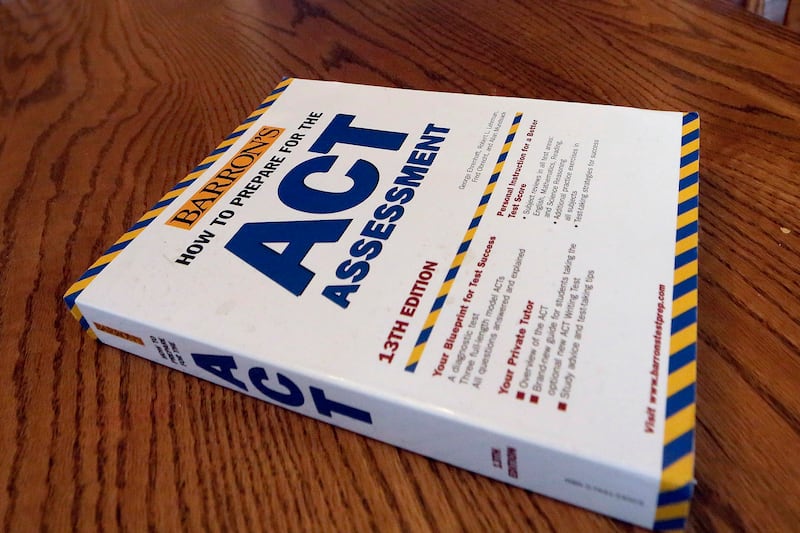Changes are coming to the ACT.
On July 15, Janet Godwin, CEO of the ACT test, announced that a pair of “fundamental” changes would be coming to the test starting in 2025.
ACT makes science section optional
The first of the changes is to make the science section of the test, like the writing portion, optional. English, math and reading will remain as the main parts of the test, but with this change, students can now take several different versions of the ACT test:
- The base ACT (English, math, reading)
- The base ACT plus writing (English, math, reading, writing)
- The base ACT plus science (English, math, reading, science)
- The base ACT plus writing and science (English, math, reading, writing, science)
In an official release from the ACT, Godwin said this will allow students to “focus on their strengths and showcase their abilities in the best possible way.”
The ACT test will be shorter
The second change is make the test shorter. The base test has been reduced from three hours to two, with shorter passages in the reading and English sections and a reduced number of questions in all sections of the test. Per Godwin, this change will allow students more time to think about and answer each question.
“This change is designed to make the testing experience more manageable for students, enabling them to perform at their best without the fatigue that often accompanies longer exams.”
When will the changes to the ACT start?
According to the release from ACT, the changes to the test will begin with national online testing in spring 2025 and with in-school testing a year later in spring 2026.
Is it worth taking the ACT?
Back in 2020, during the pandemic, universities across the country suspended all or most of their ACT and SAT requirements, going “test-optional” or “test-blind” for undergraduate admissions. At the time, universities “said that the tests and the time it took to prepare for them were ‘not good uses of a student’s time, money, or emotional energy during an ongoing public health crisis,’” as previously reported by the Deseret News.
But recent months have seen a few schools across the country either reinstate them, or introduce plans to do so. According to Horizon Education, Ivy League schools like Yale, Dartmouth and Harvard, top private schools like CalTech, Georgetown and Vanderbilt, and several public universities have brought back ACT/SAT requirements or plan to.
In Utah, policies on ACT/SAT requirements vary.
- The University of Utah’s admission page says that ACT/SAT test scores are not required for general admission, direct admission programs or merit scholarships, but are required for homeschoolers and recipients of GEDs.
- Utah State University’s admission page says the ACT is “temporarily” not required for admission, though it is needed for certain scholarships and majors.
- BYU has suspended its requirement through 2026 for “most applicants,” though applicants are encouraged to submit their scores if they “feel it is a good representation of their academic abilities.”
- The ACT and SAT are optional at Weber State University, with no stated time for when that might end.
- At Utah Valley University, the ACT and SAT are only required for merit based scholarships.
- In a statement released in 2020, Southern Utah University stated it would be dropping its ACT/SAT requirements “permanently” starting in the 2021-2022 academic year.
- Utah Tech’s admissions page makes no mention of ACT or SAT requirements.
As it stands, the reality is that schools that require standardized test scores are still in the minority. Most are high-level Ivy League or top private institutions.
Even with the changes, preparing for the test can still be a painstaking and time-consuming process. For now, whether it is worth taking the ACT will depend on individual factors, including where a student wants to go to school, if they are seeking financial assistance or if they want to highlight a special aptitude in a certain academic area.
Education companies and writers weigh in on the changes
In a press release, Kaplan, a global education services company, said it thinks the changes will be beneficial for students.
“In general, we think these changes are student-friendly, especially the testing time being cut from three to two hours,” the company said.
And speaking about the change to make the science section optional, the company said, “This additional flexibility allows students to highlight their academic strengths to colleges that they alone decide on.”
David Blobaum of Summit Prep, an ACT and SAT tutoring company based out of New Jersey, speculated on what will happen when the changes are implemented.
One of the major things is that the difficulty of the questions is allegedly going to stay the same. According to Blobaum, “the ACT has said (and I believe them) that they are not going to make the questions harder — they are literally just giving students more time on them.”
Past changes to the SAT test made the questions harder and saw a dip in scores, but Blobaum expects that scores will rise in the ACT, at least temporarily.
“It is a tempting proposition to bet that the first few ACT tests will be easier to score higher on. So, in the short-term, I wouldn’t be surprised if there was a temporary bump in scores.”
But something students also need to be aware of is the reduction of questions also changes their weight. “The flip side of this”, Forbes contributor and college counselor Scott White writes, “is that each question now has more effect on the score, with small mistakes having a greater effect.”


